Leicester City: The inside story of La Manga and the Foxes last cup final
- Published
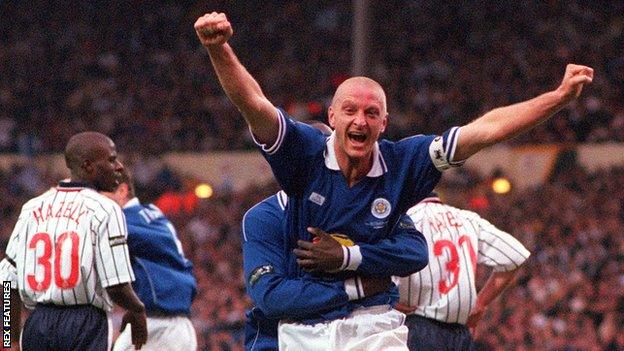
Matt Elliott celebrates scoring in the 2000 League Cup final - Leicester's last Wembley cup final appearance
FA Cup final |
|---|
Date: Saturday, 15 May. Kick-off: 17:15 BST. Venue: Wembley Stadium. Coverage: Live on BBC One, BBC Radio 5 Live, iPlayer and BBC Sport website |
It seemed a good idea at the time. The Spanish resort of La Manga appeared the ideal location for warm weather training when Leicester City last reached a Wembley cup final.
Their players - including Robbie Savage, Neil Lennon and new signing Stan Collymore - flew to the exclusive sports and leisure complex for a short break before the League Cup final in February 2000.
Manager Martin O'Neill was to join them a day later. He didn't make it.
On the second morning, Leicester were heading back to England and straight into a media storm, their cup final preparations in chaos after being thrown out of their luxury accommodation when a fire extinguisher was discharged in a piano bar.
"I think Stan was bored and decided to liven the place up," Gerry Taggart, the former Leicester and Northern Ireland defender, tells BBC Sport.
"It was a foam extinguisher and by the end it looked like Christmas. It looked like snow had covered the bar."
Twenty-one years on from that final against Tranmere Rovers, the Foxes will be hoping for a more sedate build-up as they prepare to meet Chelsea in Saturday's FA Cup final (17:15 BST kick-off).
As Brendan Rodgers' side look to win the competition for the first time, this is the story of Leicester's last cup final, told by those who lived it.
Dropped for missing team meeting
O'Neill's Leicester had a strong League Cup record at that time. They had won the trophy in 1997, and finished runners-up two years later.
When the Foxes lost 1-0 to 10-man Tottenham, external in the 1999 final, Tony Cottee dropped to his knees in tears. Aged 33, Cottee thought his last chance of winning a major trophy was gone.
O'Neill made a promise to the former West Ham and Everton forward that Leicester would be back the following year.
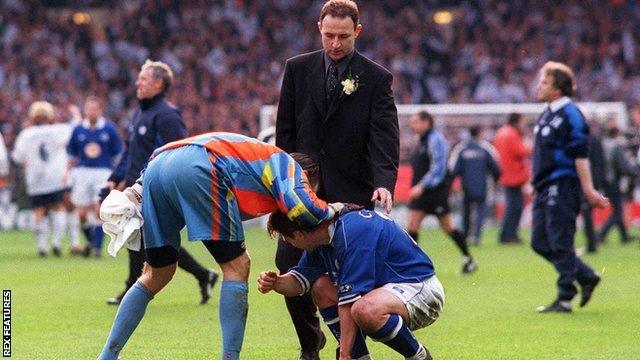
Martin O'Neill and Tottenham keeper Ian Walker console Tony Cottee after Leicester's 1999 League Cup final defeat
Having spent six years as a player under legendary manager Brian Clough at Nottingham Forest, twice winning the European Cup and once the league title, O'Neill's passion rubbed off on his eclectic group of players but, as Frank Sinclair discovered, he possessed a ruthless streak.
Sinclair was sent home on the eve of the 1999 final for missing a team meeting when his taxi got stuck in traffic taking him back to the squad's hotel following a shopping trip.
"It was devastating at the time," Sinclair, who had arrived at Leicester a two-time FA Cup winner with Chelsea, says. "I had my own personal incentive to get back to Wembley and win it."
Winger Steve Guppy remembers O'Neill's inspirational team talks, while Matt Elliott, Leicester's captain in the 2000 final, recalls a clever and emotional leader.
"If we won, it was like winning the World Cup and if we lost it was doomsday," adds Elliott. "Martin was far too intelligent to be a manager. He was two steps ahead of most people."
Collymore, fined two weeks' wages, external for the La Manga incident, and Sinclair were not the only players to feel O'Neill's wrath.
A few days before the Tranmere final, Ian Marshall made a phone call to his manager he would later regret.
"Martin didn't mind us going away but he'd always say 'don't get into trouble'," Marshall, scorer of three goals during Leicester's run to the final, says.
Then La Manga happened.
La Manga: Two little words, so much trouble
Two weeks before the final - and five years after an £8.5m move from Nottingham Forest had made him Liverpool's record signing - Collymore joined Leicester from Aston Villa for a nominal fee.
Collymore's time at Villa had been dominated by press reports about his private life, external and inconsistent form on the pitch - while he received counselling for stress.
Cup-tied for the League Cup final after appearing in the competition on loan at Fulham, Collymore was nevertheless involved in the build-up, including the trip to Spain, where several players headed straight to the bar after arriving.
With the drinks flowing, Marshall thought it was a good idea to phone O'Neill, who was preparing to fly out the next day, to ask if the players could stay up longer than the agreed 11pm curfew.
The former Everton player says: "It goes to answer phone and I'm like: 'All right gaffer, it's Marshy. We're having a great time. Is there any chance the lads can have a late one? When you get this message, give us a bell.'"
O'Neill did not phone back.
Not long after Marshall's call, the bar was covered in foam along with many of the guests in it.
"Stan had already been warned not to let the extinguisher off," remembers Taggart.
Marshall adds: "Stan was trying to be one of the lads. It was a quick blast of the extinguisher but the room filled with this white cloud. The bar looked like a bombsite by the end."
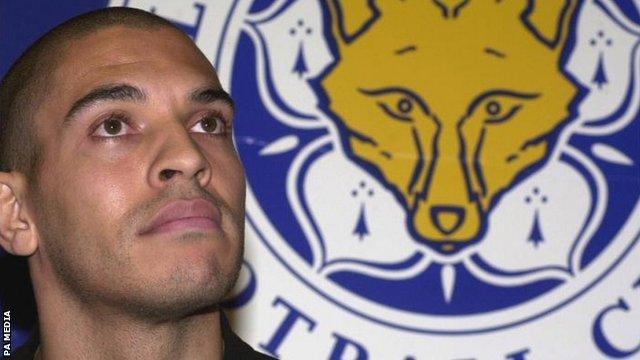
One week after signing him from Aston Villa, Leicester City fined Stan Collymore two weeks' wages for letting off a fire extinguisher at the La Manga resort in Spain
Less than 24 hours after arriving, the team left La Manga in shame as O'Neill and Elliott, who had stayed behind to be with his pregnant wife, were preparing to fly out.
"I met the gaffer at the training ground and we were about to drive to the airport when his mobile rang," recalls Elliott. "An hour and a half later, he was still swearing down the phone.
"When the call ended, I asked if everything was OK. He said: 'Put it this way, you need to take your suitcase out of the boot.'"
By now, Sky was reporting on what had happened in La Manga and reporters gathered at Gatwick Airport awaiting the team's return.
"We were sitting around the swimming pool waiting for the coach to take us back to the airport and there were paparazzi in the trees taking pictures. We knew we were in trouble," adds Marshall.
A furious O'Neill ordered his players to a meeting at the Sketchley Grange Hotel in Hinckley, a 14-mile drive from Filbert Street, then Leicester's ground, where he made his feelings clear.
"Stan sat at the front knowing he was going to get the brunt of the manager's fury," adds Marshall.
"But he walked past Stan and came right up to me and said: 'Don't you ever call my number again. You haven't earned the right to call me on my mobile.' Like Stan, I was fined two weeks' wages."
Taggart believes the events in La Manga and the subsequent fallout galvanised the team.
"The players left the meeting saying 'we definitely need to win this final'," he adds.
Several days later, Leicester were on their way to Wembley.
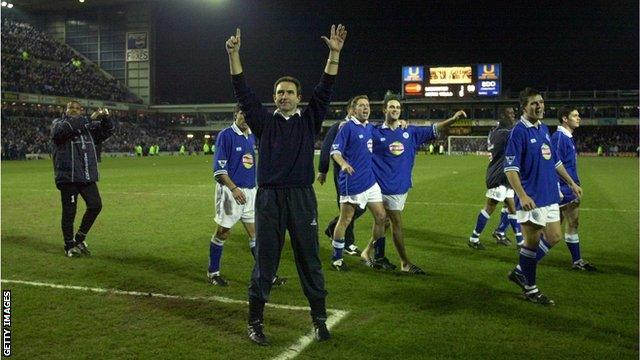
Martin O'Neill celebrates with his Leicester players after beating Aston Villa at Filbert Street to reach the League Cup final in 2000
'Savage bit my face'
Their run to a third League Cup final in four seasons had been far from smooth. Greece midfielder Theodoros Zagorakis ended up in goal during one tie with Crystal Palace after injuries to keeper Pegguy Arphexad and replacement Tim Flowers.
There was a penalty shootout win over David O'Leary's Leeds, while Leicester trailed Fulham 2-0 with six minutes remaining in the quarter-finals. They eventually went through, Marshall scoring twice.
"The team was a mix of waifs and strays to some degree with a blend of quality and experience in the shape of Flowers, Cottee and Sinclair," adds Elliott.
Unlike the previous year against Spurs, O'Neill's side were now the favourites to win the cup but second-tier Tranmere, a strong side under John Aldridge's management, were not to be underestimated.
Any pre-match nerves were eased when Elliott headed Leicester in front from a corner before Tranmere's Clint Hill, who had earlier been booked, was sent off for a foul on Emile Heskey.
Former Foxes striker David Kelly equalised with 13 minutes left before another Elliott header made it 2-1, external to secure Leicester's first Wembley cup final win.
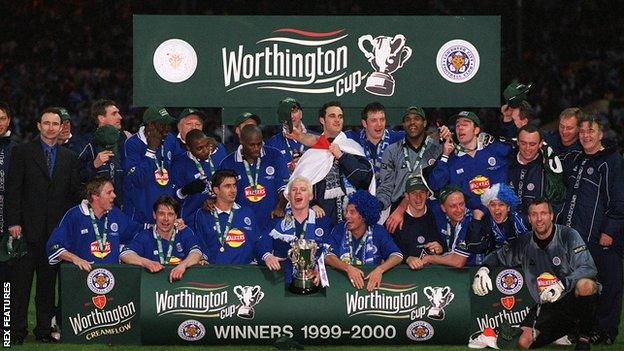
Leicester's starting XI in the 2000 League Cup final was: Tim Flowers, Frank Sinclair, Matt Elliott, Gerry Taggart, Steve Guppy, Muzzy Izzet, Robbie Savage, Neil Lennon, Stefan Oakes, Emile Heskey and Tony Cottee
When the referee blew for full-time, Taggart and Lennon embraced on the pitch, the pair - who grew up together in Northern Ireland - overcome with emotion.
Midfielder Savage leapt on Elliott and unintentionally bit his captain on the side of his face. "I felt blood trickling down my cheek. It looked like a war wound in the heat of battle," says Elliott. "It was Sav getting carried away, sinking his teeth into me."
O'Neill was congratulated by his former manager Clough, who was watching in the stands, while Elliott's father, Alan, picked up £600 winnings after placing a £20 bet on his son being the first and last scorer.
It was O'Neill's last great day with Leicester. Three months later, he left for Celtic.
"Everything after that was downhill," says Elliott, who was named man of the match at Wembley.
But more than two decades on, Leicester have made it back to a cup final.

Salford's 'Mr Big': Paul Massey's rise in the criminal underworld through violence and extortion
Dive into 2010s nostalgia with our quiz: How much do you remember about music from the last decade?
